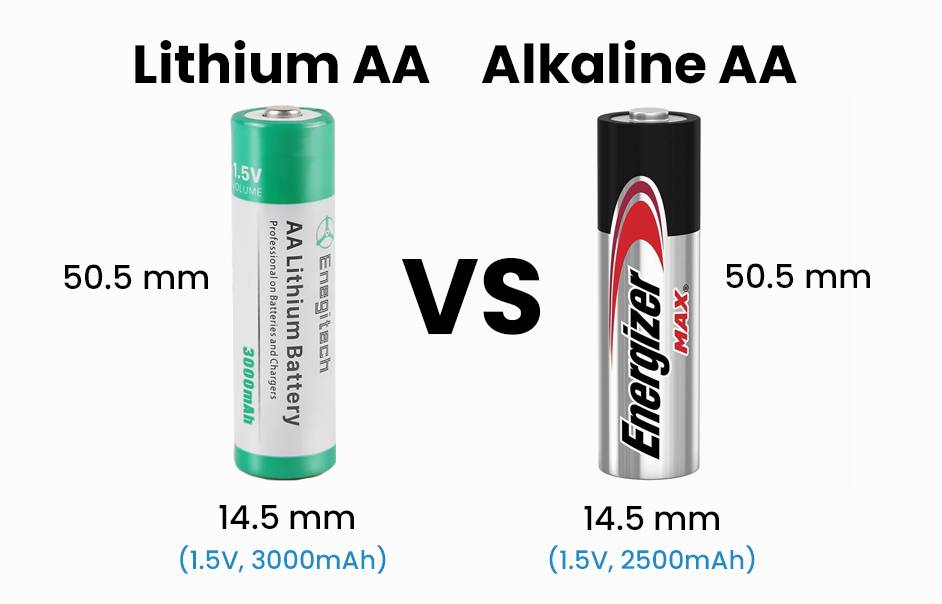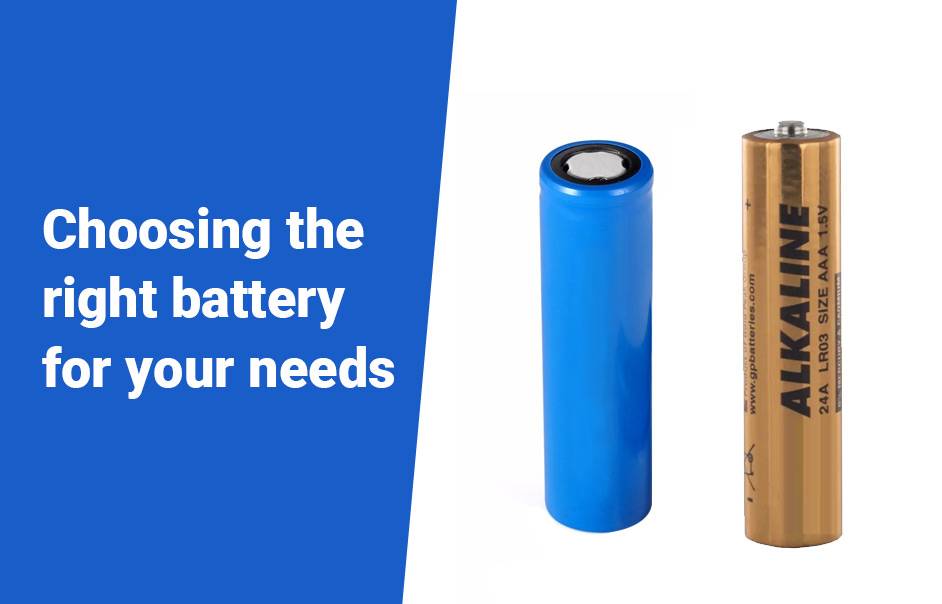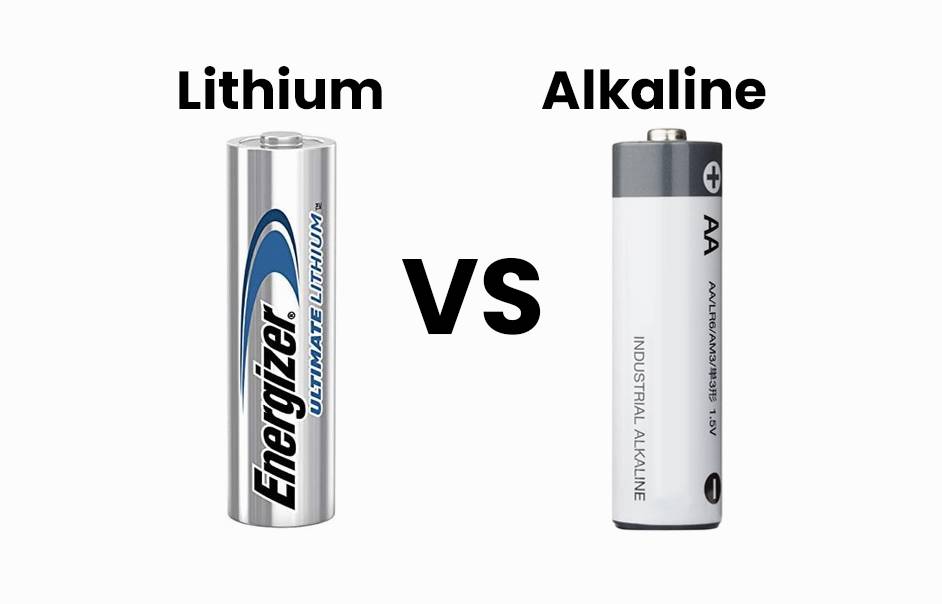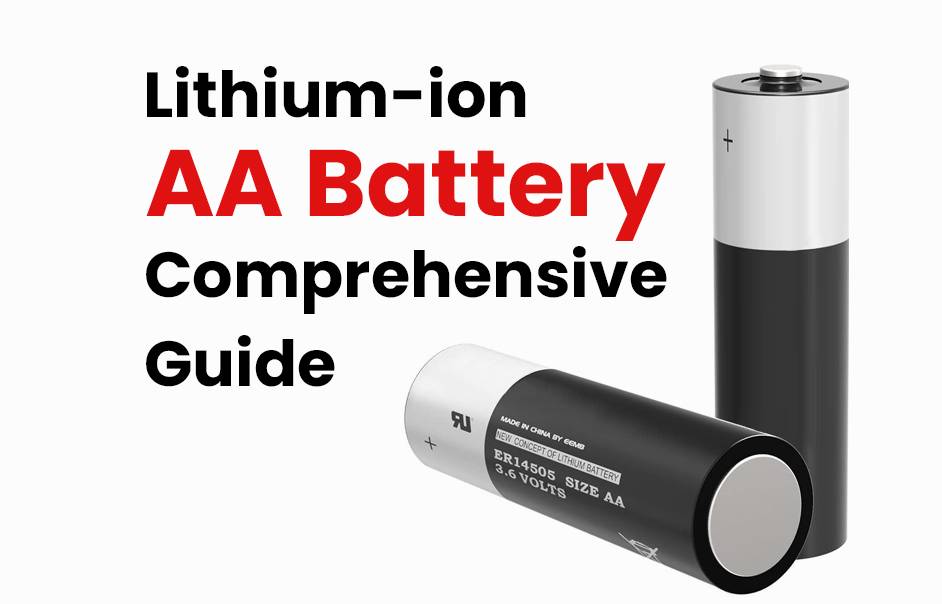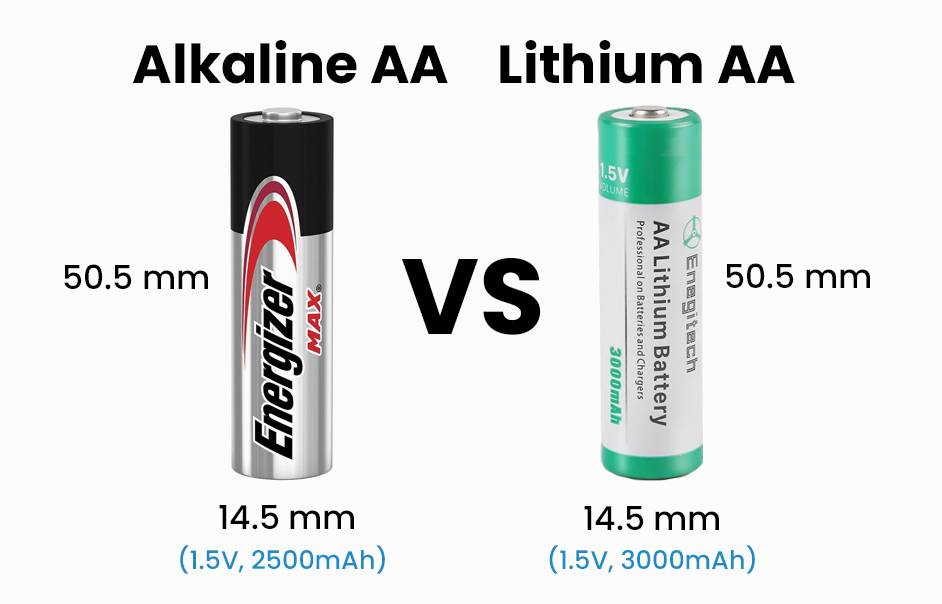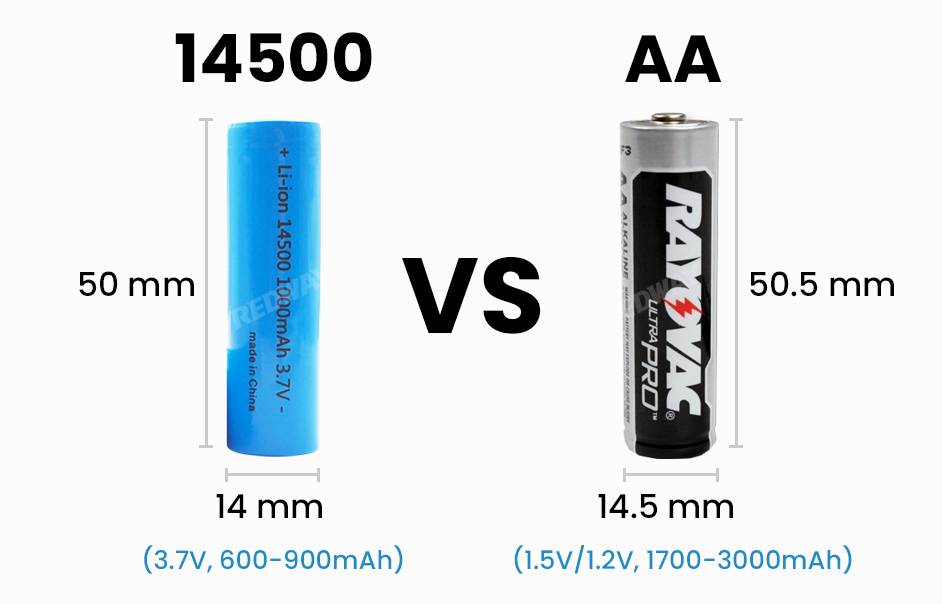Lithium AA batteries are generally considered better than alkaline AA batteries. While they may cost more, lithium batteries last 8 or even 10 cycles longer than alkaline batteries. They also maintain their full voltage almost until the end of their charge life, providing consistent and reliable performance. Understanding the differences helps in choosing the appropriate battery type for specific needs. We’ll explore the distinctions between these two common battery types, guiding you to make an informed choice for your energy-hungry devices. Brace yourself for an electrifying showdown as we unveil the true powerhouse in this battery battle!
What are AA batteries?
What is an alkaline battery?
An alkaline battery is a type of primary battery that uses zinc and manganese dioxide to produce energy. It has a pH value above 7 and offers reliable performance, long shelf life, and versatility in devices like cameras, toys, and flashlights. Alkaline batteries are popular due to their higher energy density and longer lifespan compared to other types of batteries. They are commonly used in various electronic devices.
What is a lithium-ion battery?
A lithium-ion battery, abbreviated as Li-ion, is a rechargeable battery that stores energy by moving lithium ions. It offers higher energy storage, efficiency, and lifespan compared to other batteries. Li-ion batteries power electronics, laptops, phones, and electric cars. They come in different chemistries like lithium cobalt oxide, lithium iron phosphate, and lithium nickel manganese cobalt oxide. Li-ion batteries have revolutionized our devices and find applications in various fields.
The difference between Lithium and Alkaline batteries
Lithium batteries and Alkaline batteries have distinct differences. While lithium batteries can last 8 to 10 cycles longer than alkaline batteries, they also cost more. Additionally, lithium batteries maintain their full voltage throughout their charge life, while alkaline batteries gradually reduce their voltage output. Understanding these differences can help determine which battery type is best suited for specific applications.
- Materials Used:
- Lithium batteries feature lithium as the primary component, delivering higher voltage and consistent power. Alkaline batteries rely on zinc and manganese dioxide for their chemical reactions.
- Performance Characteristics:
- Lithium AA batteries outlast alkaline counterparts due to higher energy density and a lower self-discharge rate. Ideal for high-drain devices, they provide continuous and robust power.
- Cost Considerations:
- Lithium batteries are pricier than alkaline ones. While they offer superior performance, frequent replacements may incur higher costs over time.
- Environmental Impact:
- Rechargeable lithium-ion batteries present a more sustainable option compared to disposable alkaline batteries.
- Voltage Difference
In conclusion, the choice depends on specific needs. For extended performance and high-drain devices, lithium batteries are optimal despite the higher cost. Alternatively, if budget considerations are paramount and prolonged battery life is unnecessary, alkaline batteries offer a cost-effective solution for everyday use.
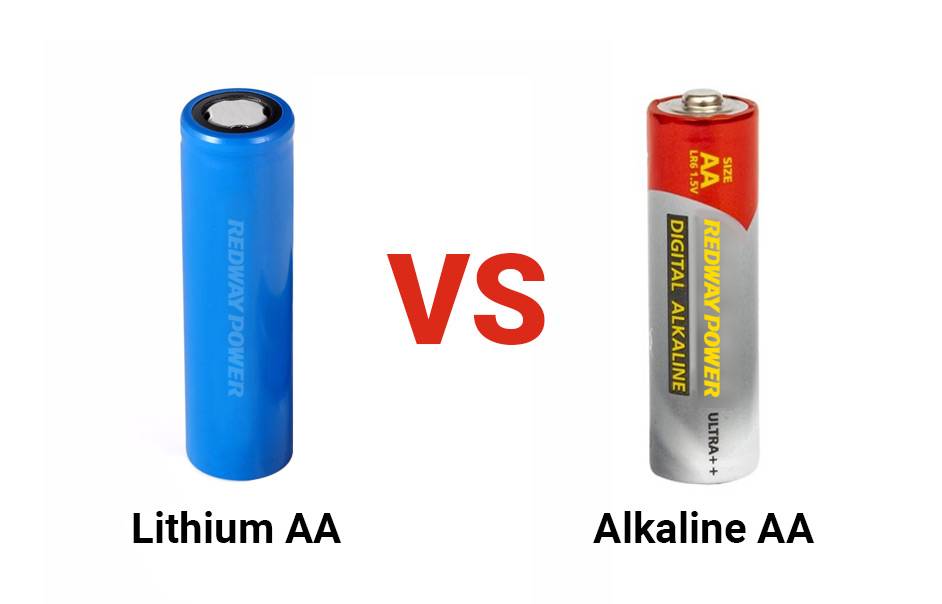
Pros and Cons of Lithium AA batteries
Lithium AA batteries offer several advantages over other types. They are inherently safe, lightweight, and provide longer lifespan and more usable capacity. With a constant power output, they can withstand temperature variations. Lithium AA batteries are available in standard sizes, making them a drop-in replacement. They can be charged quickly and safely.
While lithium AA batteries offer numerous advantages, they also have a few drawbacks to consider. Some of the cons of lithium AA batteries include:
1. Protection Required: Lithium-ion cells and batteries require protection from overcharging and discharging to ensure safety.
2. Aging Effect: Lithium-ion batteries naturally degrade over time due to aging.
Understanding these disadvantages can help users make informed decisions when choosing battery options.
Pros and Cons of Alkaline AA batteries
Alkaline AA batteries offer advantages including high energy density, personal and environmental safety, long battery life, low-temperature operation, and standard sizing. With more energy packed into each battery, alkaline batteries provide reliable power for extended periods. They have minimal leakage risk and are safe to handle. Alkaline AA batteries perform well in low-temperature environments and are compatible with a wide range of devices.
While Alkaline AA batteries offer several advantages, they also have a few drawbacks to consider. Some cons of Alkaline AA batteries include:
1. Bulkier size compared to lithium alternatives.
2. Risk of explosion when charged with a faulty charger.
3. Potential leakage of corrosive liquid that can damage devices.
4. The chemicals used in alkaline batteries are toxic.
5. High internal resistance, which reduces power output.
Lithium AA Battery vs Alkaline AA Battery in Performance
When comparing the performance of Lithium AA batteries and Alkaline AA batteries, several factors come into play. Lithium batteries may cost more than Alkaline batteries, but they often last 8 to 10 cycles longer and maintain their full voltage almost until the end of their charge life. Alkaline batteries, on the other hand, gradually reduce their voltage output throughout their performance.
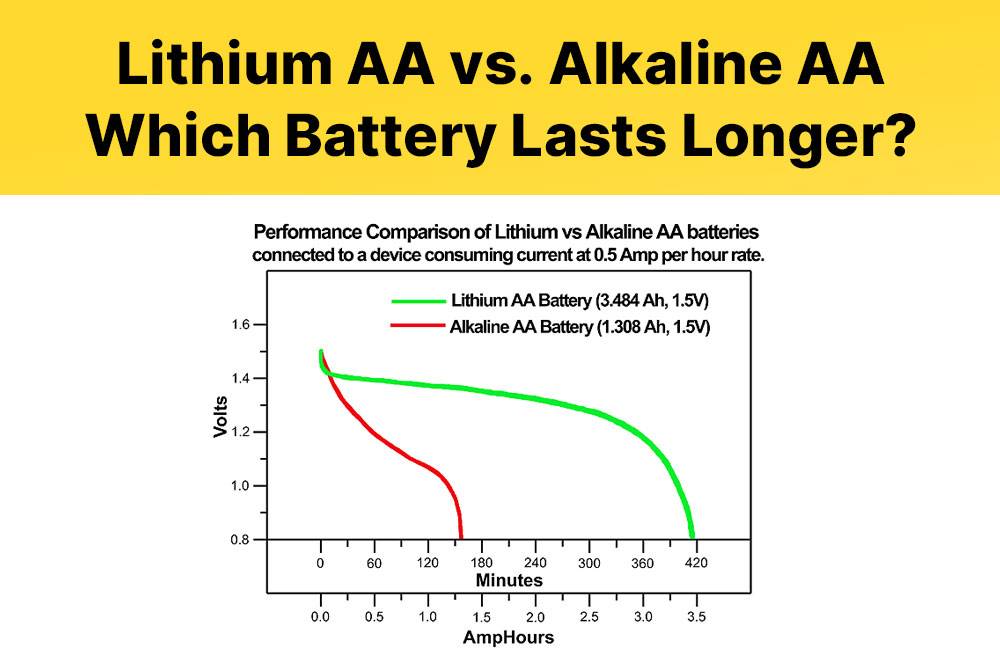
Lithium AA Battery vs Alkaline AA Battery in Cost
When comparing the cost of Lithium AA batteries and Alkaline AA batteries, it is important to consider factors such as lifespan and performance. While Lithium batteries may cost more upfront, they often last 8 to 10 cycles longer than Alkaline batteries. Therefore, the cost-effectiveness of each battery type depends on the specific needs and usage patterns.
Lithium AA Battery vs Alkaline AA Battery in Environmental impact
When comparing the environmental impact of Lithium AA batteries and Alkaline AA batteries, several factors come into play. Alkaline batteries use common metals such as zinc and manganese, which are widely available and have less environmental impact during extraction. Lithium batteries, on the other hand, have a higher carbon footprint due to the energy-intensive extraction process and long-distance transportation of lithium.
Lithium AA Battery vs Alkaline AA Battery, which is better?
When comparing Lithium AA batteries and Alkaline AA batteries, several factors come into play. Lithium batteries last 8 to 10 cycles longer than Alkaline batteries and maintain their full voltage almost until the end of their charge life. Additionally, Lithium batteries can withstand low-temperature variances better than Alkaline batteries. However, the choice between the two depends on specific needs and considerations.
FAQs
What’s the performance difference between alkaline and lithium batteries?
Lithium batteries outperform alkaline batteries in several ways. They have higher energy density, lasting longer in devices. They can tolerate extreme temperatures and are lightweight, ideal for portable devices. However, they are more expensive and may not be necessary for inexpensive devices. Always check compatibility before replacing batteries.
What’s the shelf life difference between alkaline and lithium batteries?
Lithium batteries have a longer shelf life compared to alkaline batteries. While alkaline batteries last for about 5 to 10 years, lithium batteries can last up to 12 years or even 20 years in rare cases. Additionally, lithium batteries have a lower rate of self-discharge when stored.
What are the application differences between alkaline and lithium batteries?
Alkaline batteries are suited for low-drain devices like remote controls, clocks, and toys. They are readily available and economical. On the other hand, lithium batteries are preferred for high-drain devices like digital cameras, smartphones, and laptops. They offer long-lasting power, stable voltage, and resistance to extreme temperatures. Choose lithium batteries for infrequently used devices or emergency kits, and alkaline batteries for low-to-medium drain items used occasionally.
What’s the cost difference between alkaline and lithium batteries?
Lithium batteries are more expensive than alkaline batteries, costing up to three times more upfront. However, they last significantly longer, making them a good investment for high-tech devices and situations where changing batteries is inconvenient. Keep in mind that the extra cost may not be justified for inexpensive, noncritical devices like toys.
What’s the power capacity difference between alkaline and lithium batteries?
The power capacity of alkaline batteries typically ranges from 2,500 to 3,000 milliampere-hours (mAh). In comparison, lithium batteries can have a higher capacity, ranging from 2,000 to 3,500 mAh or more, depending on the type and size. It’s important to note that capacity may vary depending on the brand and model of the battery.
What’s the difference in materials between alkaline and lithium batteries?
Alkaline batteries use zinc and manganese dioxide for the cathode and anode, respectively, while lithium batteries utilize different materials like lithium cobalt oxide, lithium iron phosphate, or lithium nickel manganese cobalt oxide for the cathode. The anode of lithium batteries is made of lithium or lithium alloy. These differences in materials contribute to the distinct performance characteristics of each battery type.
What is the difference between lithium and alkaline AAA batteries?
Lithium AAA batteries are lighter, smaller, and have a higher energy density, making them ideal for portable devices. In contrast, alkaline AAA batteries are heavier and bulkier, which can be less convenient for portable use. Lithium batteries provide a compact and efficient power solution for various devices.
What are the disadvantages of an alkaline battery?
Disadvantages of alkaline batteries include self-discharge over time, limited performance in high-drain devices, voltage drop affecting device performance, and environmental impact due to toxic materials. Despite these drawbacks, alkaline batteries remain popular due to their availability and affordability.
What are the disadvantages of a lithium-ion battery?
Disadvantages of lithium-ion batteries include higher cost, limited lifespan due to capacity degradation over time, safety concerns like the rare risk of thermal runaway, sensitivity to high temperatures, and the need for proper charging management. Despite these drawbacks, lithium-ion batteries are popular for their high energy density and widespread use in portable electronics and electric vehicles.
Why do lithium batteries last longer than alkaline batteries?
Lithium batteries last longer than alkaline batteries due to their higher energy density, stable voltage output, lower self-discharge rates, and excellent performance in high-drain devices. These advantages contribute to their extended lifespan and reliability, making them a preferred choice for various applications.
Is it okay to use alkaline batteries instead of lithium?
While alkaline batteries can be used instead of lithium batteries in many low-to-medium drain devices, it’s important to consider a few factors. Alkaline batteries may not perform as well in high-drain devices, and lithium batteries have a longer overall lifespan. Additionally, while alkaline batteries are more affordable upfront, lithium batteries offer better long-term value. Always follow the device manufacturer’s recommendations for optimal performance.
Why do lithium batteries last longer than alkaline?
Lithium batteries last longer than alkaline batteries due to their higher energy density, stable voltage output, lower self-discharge rates, and excellent performance in high-drain devices like digital cameras and smartphones. These advantages contribute to their extended lifespan and reliability, making them a preferred choice for various applications.

